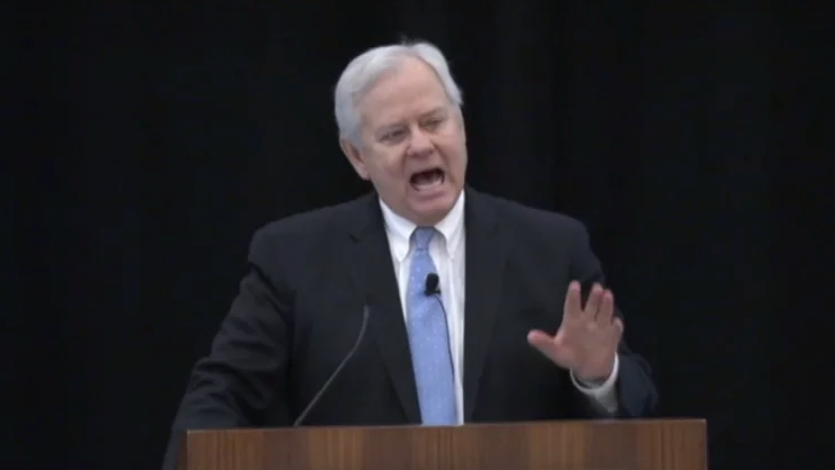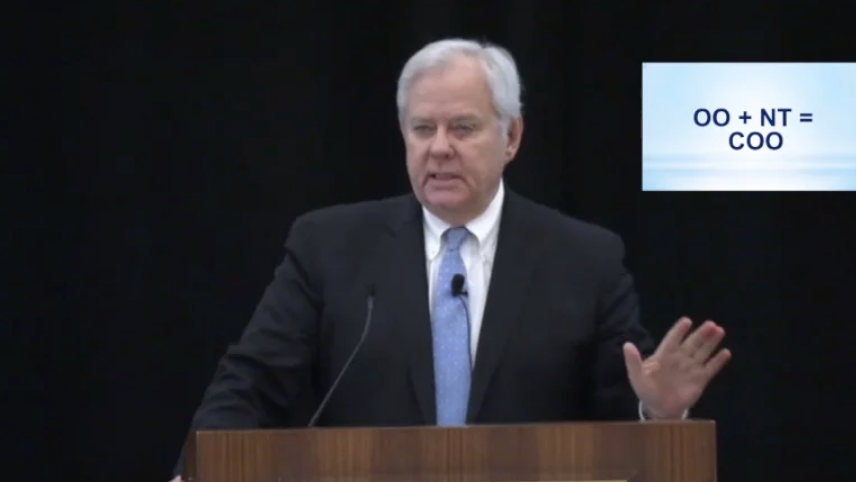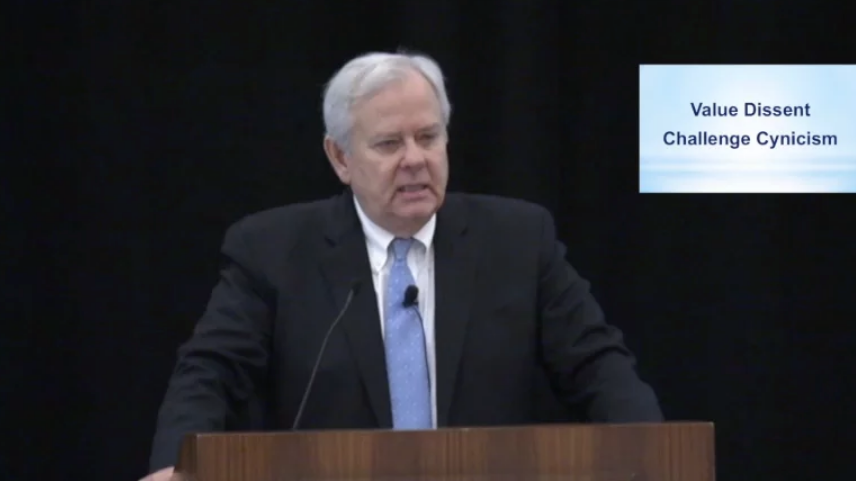— Tim O’Connor
Ambassador & a principal negotiator in the Northern Ireland Peace Accord
Healer, Leader, Partner : Optimizing Physician Leadership in Transforming Health Care
Health care continues to improve the quality and predictability of care outcomes so patients can experience improved health and decreased suffering. But we still see daily examples of uneven quality and access and an increasing problem of affordability for patients and families. Physicians are not more important than all of the other stakeholders in health care, but we do have disproportionate impact on outcomes due to the many touch points where we significantly impact the process and/or outcome. This disproportionate impact should engender disproportionate accountability to “opt in” to all the ways health care touches our patients and families : physically, socially, psychologically, and financially. We track the evolution of health care from both the patients view and that of the physician. We follow the rapid growth in knowledge, technology , and both diagnostic and therapeutic options. This marvelous increase in knowledge nd capability has also created major increases in complexity that are radically forcing change that is pressing on both patients and physicians. We bring the past as a source of learning to the present and offer a clear eyed view of the impact of complexity as described , but add more development of added complexity as patients are cured or stabilized from difficult illnesses and go on to develop additional conditions. All of this lands in the middle of the doctor-patient relationship and has made many aspects of the experience better, but other aspects very difficult. We show how the current state for both patients and physicians must change and improve and outline how physicians must not become victims to all the change, but become leaders in improving care in this age of technology and information explosion.. Details of how the model of one doctor, one patient, and one paper chart can be enthusiastically changed into care that is delivered using technology, information, and teams to create excellent and personal care is demonstrated. Tangible examples add proof points to this very positive future state that can create a health care system that patients want, need, and deserve but also provide physicians a growing sense of professional confidence and pride in their work and being the kind oh healing physician they believe has been and should be their standard.
From Integrated Care and ACO’s to Excellence
Health care continues to create advances and breakthroughs in knowledge, understanding, technology, therapeutics and outcomes. As part of this progress, Dr. cochran notes there is a growing challenge of complexity of this knowledge and technology , resulting in patients living with very complex conditions as a result of the wonderful improvements in care they have experienced. In addition to ongoing needs to invest in technology and learning, it has been clearly shown that health care needs to organize into systems that can begin to leverage such structural advances as group practice, integration, and technology to coordinate care at a highly reliable level. These organizations have a variety of structures both real and virtual. But the limitations of simply buying or assembling pieces to attain a certain structure have been experienced by many organizations.
The critical success factors to leverage these structures are defined and the journey of learning is examined to reach the state where you not only have the structures and investments in place, but have also been very intentional in developing the people, leadership, and culture to create excellent outcomes reliably and improve consistently. Relating tangible examples and stories of organizations who became competent and even enthusiastic toward measurement and improvement and leading change. From the importance of absolute clarity of destination or vision to embedding shared and co-created solutions to the focused and substantive investment in time and training for the change ,the elements needed to proceed are clearly identified. The selection of early adopter targets and the building of trust through peer credibility are emphasized . Creating an organizational culture that embraces measurement, acknowledgement, reflection, learning and improvement becomes a source of expectation and enthusiasm .Structure matters, but the ability to optimize the function of the structure are differentiating.
The Four Questions
At a time when we regularly hear about the advances, breakthroughs, and even cures in health care too many patients are suffering and too many physicians and other health care workers are suffering. Physicians have disproportionate impact on health care in many ways and we can’t be silent bystanders to what is happening to too many of our patients and colleagues. I challenge physicians to ask them selves four questions and together we can reveal and create answers and actions to finally address the true breadth and depth of the impact of our health care system.
Question #1 “Is Excellent Good Enough?
In spite of the improvements and even miracles in health care, our patients experience uneven quality and access to care and affordability at an individual and family level . In spite of the outstanding care delivered everyday, we still have many examples of underuse, overuse, misuse, and error impacting our patients and families. In fact, medical error is still the #3 cause of death in the U.S. There are answers to these questions and pathways to improvement ,but physicians have to develop a comprehensive awareness of the reality of our patients and their needs and to become committed team players to develop cultures of safety and excellence
Question #2 “What Kind of Ancestor Will I Be?
We are seeing some very disturbing trends in our profession with a significant number of physicians, when surveyed, answer the question, “No,” when asked if they would recommend their child become a physician. All we have to look at is each of our applications to medical school and read those paragraphs we wrote to declare why we wanted to become physicians to be struck by the hope and passion oh that 21 year old idealist. And it remains a noble and honorable profession and calling.
Remember the role of “patient” is involuntary and they will forever look to us with their fear, uncertainty, and pain. The calling of th physician remains noble, but much focus , learning, and improvement must happen as we create vaiid solutions to ensure that the future of our profession is one of well being, satisfaction , and vitality for our colleagues
Question #3 – How Big is Our Ambition?
Some physicians believe that or responsibility begins and ends with a good quality outcome for our individual patients. And I agree that is the ideal and the essence of the covenant of trust between doctors and patients. But there is a rapidly growing awareness of the financial impact of health care as an agent of wealth transfer. Governments, corporations, and families are increasingly faced with tradeoff decisions involving health care costs. At the level of the family, it has become such an issue that they are forced to “ration health care at the kitchen table” on a daily basis by making conscious tradeoffs between family essentials and recommended health care. Over $.80 of every health care dollar is spent on care delivery and we have major impact at the point of care and in the institutions where we work to make sensible decisions that never compromise quality but include the bigger picture reality.
Question #4 – How Broad is My Responsibility?
The total spending on health care is front page news around the country and how do we define our population of those we are responsible ? If we care for 250,000 patients in a city of 1,000,000, do we care about those 750,000? Do we have any responsibility to them ? Is it OK for competition and business success to keep us from collaboration and shared learning ? When two competing hospitals continue to invest in and build services and structures with NO consideration for looking at disciplined collaboration, there is a likelihood that over capacity in the name of competition is at work. There are some bold communities and organizations in the world that openly share their clinical knowledge with all who wish and there are similar examples where organizations placed the needs of the entire community and affordability on the table along with parochial success. I don’t think we can treat our way to affordable health care, and we can’t legislate our way.
BUT, we can learn, share, and collaborate our way? Ready?




